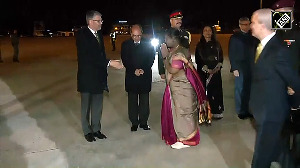Telecom equipment vendor Nokia-Siemens filed a case in the Delhi High Court today against its disqualification on technical grounds as a bidder for state-owned Bharat Sanchar Nigam Ltd's tender for 94 million lines, one of the world's largest telecom contracts worth over Rs 50,000 crore.
Another company is also planning to take action against the BSNL decision in the court. Apart from Nokia-Siemens, Chinese equipment maker ZTE Telecom, Nortel and Alcatel Lucent were disqualified on technical grounds. Nokia-Siemens had bid for the northern, southern and western zones.
BSNL's tender requires vendors to provide 25 million lines each in north, west and south and 19 million lines in the east.
The disqualified companies have raised objections to the fact that BSNL rejected their bids without providing a reason or clarification.
Nokia-Siemens had earlier pointed out that the BSNL tender favoured some vendors. Confirming that the company had approached the high court, a spokesperson said: "Looking at the magnitude of the bid in some zones, only single bidders qualified, which is a matter that should be examined."
Nokia-Siemens has also complained to the recently constituted Competition Commission of India and to the Central Vigilance Commission on the same issue.
Thursday's move closely follows BSNL's rejection of bids by Chinese manufacturer Huawei Telecommunications, which has a share of around 15 per cent of the telecom equipment market, to supply GSM-technology equipment for BSNL's east and west zones on account of national security-related stipulations by the Department of Telecommunications (DoT) issued a few days ago.
DoT's new procurement norms disallow Chinese vendors from putting up telecom equipment in sensitive states that have international borders with China, Bangladesh, Myanmar and Pakistan.
On the basis of this direction, BSNL has decided to offer Huawei a contract only in the southern zone, which does not border any of these countries. Huawei has, however, won contracts from private sector vendors like Reliance Communications, BPL Mobile and Sistema-Shyam in circles that border sensitive states.
Asked about the ban, a Huawei spokesperson said: "We have not received any communication from BSNL."
BSNL executives were unavailable for comment. A top DoT official, however, said: "We have put forward the concerns raised by the home ministry and it is up to BSNL to take a decision. In all likelihood, it will accept our suggestions."
Only Huawei and Ericsson qualified for the financial bids in the four zones. DoT's security strictures mean that Ericsson will get the contract for the north and east and Huawei will get the south. The west might be given to state-owned ITI, but no decision has been taken yet.
Meanwhile, DoT's new policy of selective zonal exclusion for Chinese vendors has been opposed by the Intelligence Bureau and the defence ministry. Both think Chinese vendors should not be allowed to supply equipment in any part of the country.
Intelligence officials said the south, with its long coastline, can also be considered sensitive, so the distinction based on zones might not be relevant. Concerns have also been raised about the close relationship between some Chinese companies and the Chinese state and security agencies. Representatives from the ministry of defence raised the issue that some Chinese companies set up with the assistance from People's Liberation Army, have been blacklisted by the US and have court cases pending against them. They also stated that the network operation centres, from where the networks are monitored, should be located within the country.
Telecom industry analysts consider the restriction on Chinese manufacturers unusual because private telecom companiies have liberally used them as vendors even in sensitive states. For instance, Huawei has supplied equipment to Reliance Communications for both CDMA and GSM telecom services across the country and Tata Teleservices, Sistema-Shyam and BPL Mobile in the west.
Sources close to Huawei pointed out that the company is also executing a contract with state- owned ITI in the south zone for BSNL, for GSM lines worth around $550 million. The contract was signed last October and no security concerns have cropped up.
The Chinese vendor has already undertaken business in India worth of over $1 billion in 2008-9. With the southern zone contract, Huawei is hoping to double the size of its business in India.
Government officials said the special concern about security for BSNL contracts arises from the fact that the network is used by the government and security forces.







 © 2025
© 2025